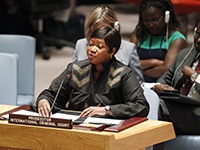The International Criminal Court (ICC) was established in 2002 as a permanent court to prosecute war crimes, genocide and crimes against humanity. Conceived as a peace project, the ICC is considered a milestone in the fight against atrocities and a highlight in international legislation. In 2016 three African ICC Member States declared their withdrawal from the treaty, which rendered an ongoing crisis obvious. Besides Burundi and Gambia, also South Africa, a former staunch supporter of the International Criminal Court, decided to resign from the treaty. These withdrawals could have serious repercussion for the future of international criminal prosecution.
In HSFK-Report Nr. 11/2016 „Der internationale Strafgerichtshof auf der Anklagebank [The International Criminal Court in the Dock]“ Antonio Arcudi discusses how the relationship between the African Union and the ICC changed over time: from strong support to vehement opposition and outright refusal. The author explains this development, assesses the criticism against the ICC and provides recommendations on how to solve this ongoing crisis.
Download (pdf, 381kb): Antonio Arcudi: Der internationale Strafgerichtshof auf der Anklagebank, HSFK-Report Nr. 11/2016, Frankfurt/M. (German only)
A printed copy of Report No. 11/2016 can also be ordered at PRIF for 6€.
Recommendations for further reading:
Caroline Fehl: Growing Up Rough: The Changing Politics of Justice at the International Criminal Court, PRIF Report No. 127 (2014) Frankfurt/M.
Clara Braungart: Von Uganda nach Den Haag, Der Internationale Strafgerichtshof und der Fall des ehemaligen Kindersoldaten Dominic Ongwen, HSFK-Standpunkt Nr. 2/2016, Frankfurt/M. (German only)
